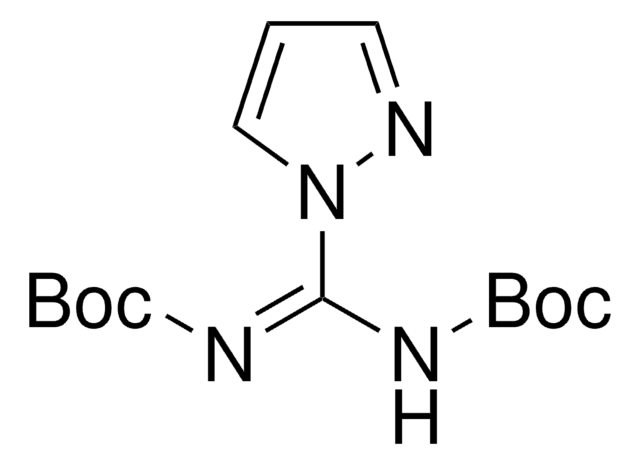402516
1H-Pyrazole-1-carboxamidine hydrochloride
99%
Synonym(s):
1-Amidinopyrazole hydrochloride, Praxadine
About This Item
Recommended Products
Assay
99%
form
powder
mp
167-170 °C (lit.)
SMILES string
Cl[H].NC(=N)n1cccn1
InChI
1S/C4H6N4.ClH/c5-4(6)8-3-1-2-7-8;/h1-3H,(H3,5,6);1H
InChI key
RBZRMBCLZMEYEH-UHFFFAOYSA-N
Looking for similar products? Visit Product Comparison Guide
General description
Application
- Preparation of guanidylated hollow fiber membranes.
- Guanylation of amines and in peptide synthesis.
- Synthesis of bis-guanidinium-cholesterol derivatives.
Signal Word
Danger
Hazard Statements
Precautionary Statements
Hazard Classifications
Acute Tox. 4 Oral - Aquatic Chronic 3 - Eye Dam. 1 - Skin Sens. 1 - STOT RE 2
Storage Class Code
11 - Combustible Solids
WGK
WGK 2
Flash Point(F)
Not applicable
Flash Point(C)
Not applicable
Personal Protective Equipment
Certificates of Analysis (COA)
Search for Certificates of Analysis (COA) by entering the products Lot/Batch Number. Lot and Batch Numbers can be found on a product’s label following the words ‘Lot’ or ‘Batch’.
Already Own This Product?
Find documentation for the products that you have recently purchased in the Document Library.
Customers Also Viewed
Our team of scientists has experience in all areas of research including Life Science, Material Science, Chemical Synthesis, Chromatography, Analytical and many others.
Contact Technical Service













